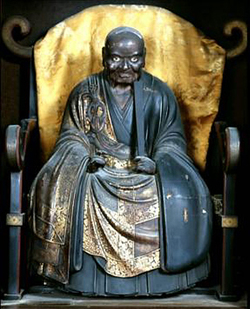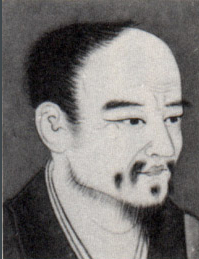 Hakuin
Hakuin Als Torei een tijdje in Hakuin’s tempel is, zit hij in zazen en denkt: ‘Master Hakuin must think I’m a very mediocre student. He seems to make a point of not using his iron hammer and tongs with me. Is it possible he doesn’t know what is in my mind?’ (Cloth Drum, p. 144)
Daarop schrijft Torei een lange brief aan Hakuin. Hij besluit met:
I beg you, master, bestow your great mercy and compassion on me and help me to reach my goal!
What else is there to say? I don’t want a Dharma robe or a comfortable life in a well-to-do temple, I want only to see the true Buddha-nature. I’m not attached to words and letters, I want only to see the true Buddha-nature. I don’t covet reputation or fame, I want only to see the true Buddha-nature. I’m not concerned with physical well-being or living a long life, I want only to see the true Buddha-nature. I don’t crave peace and tranquility, I want only to see the true Buddha-nature. I have no interest in calligraphy and painting, I want only to see the true Buddha-nature.
(Cloth Drum, p. 150)
 Torei
Torei Blijf niet hangen in eenheidsbewustzijn. Wees niet tevreden met de uitleg van zogenaamde leraren, ga verder dan zij. De wereld ontvouwt zich pas in al zijn volheid als je die comfortabele, bekende plek van ‘verblijven in niet-weten’ en ‘niet-oordelen’ voorgoed achter je laat. Kies je ervoor om in non-dualiteit te geloven, dan blijf je gevangen en lijd je eindeloos, net als degenen die er propaganda voor maken. Blijf niet in die stilstaande, stinkende vijver drijven. Ga verder. Put je uit in zoeken, een intens zoekende houding is fundamenteel in zen. Alleen maar ‘verwijlen’ is dodelijk. Leun nooit tevreden achterover en denk dat je al weet waar het om draait.
Vraag je ook niet af wat je beoefening je oplevert. Geluk en nachtrust zijn van weinig waarde. Het is beter ongelukkig te zijn en slapeloze nachten te hebben totdat je de grote vraag eindelijk helemaal hebt doorbroken. Vraag niks maar geef álles wat je hebt! Om een zin uit een bekende inauguratierede te parafraseren: ‘Don’t ask what your practice can do for you, ask what you can do for your practice!’
In Rohatsu Jishu, de aansporingen die gegeven worden tijdens Rohatsu, de meest intensieve trainingsweek van het jaar, vuurt Hakuin zijn monniken aan:
Each of us has a mother and a father, brothers and sisters and many relatives. If you were to count all of your relatives and ancestors, each one of you would find that you have tens of thousands of them. Many have passed away already and are transmigrating through the six worlds, enduring unspeakable suffering. They await your samadhi and realization as keenly as a person in the desert awaits a drop of rain. You cannot sit and daydream. Think of the importance of your mission. Time passes like an arrow and doesn’t wait for us. Bravely work hard! Do your very best!
(Sogenji Newsletter, november 1994, nummer 28)
 RSS Feed
RSS Feed

